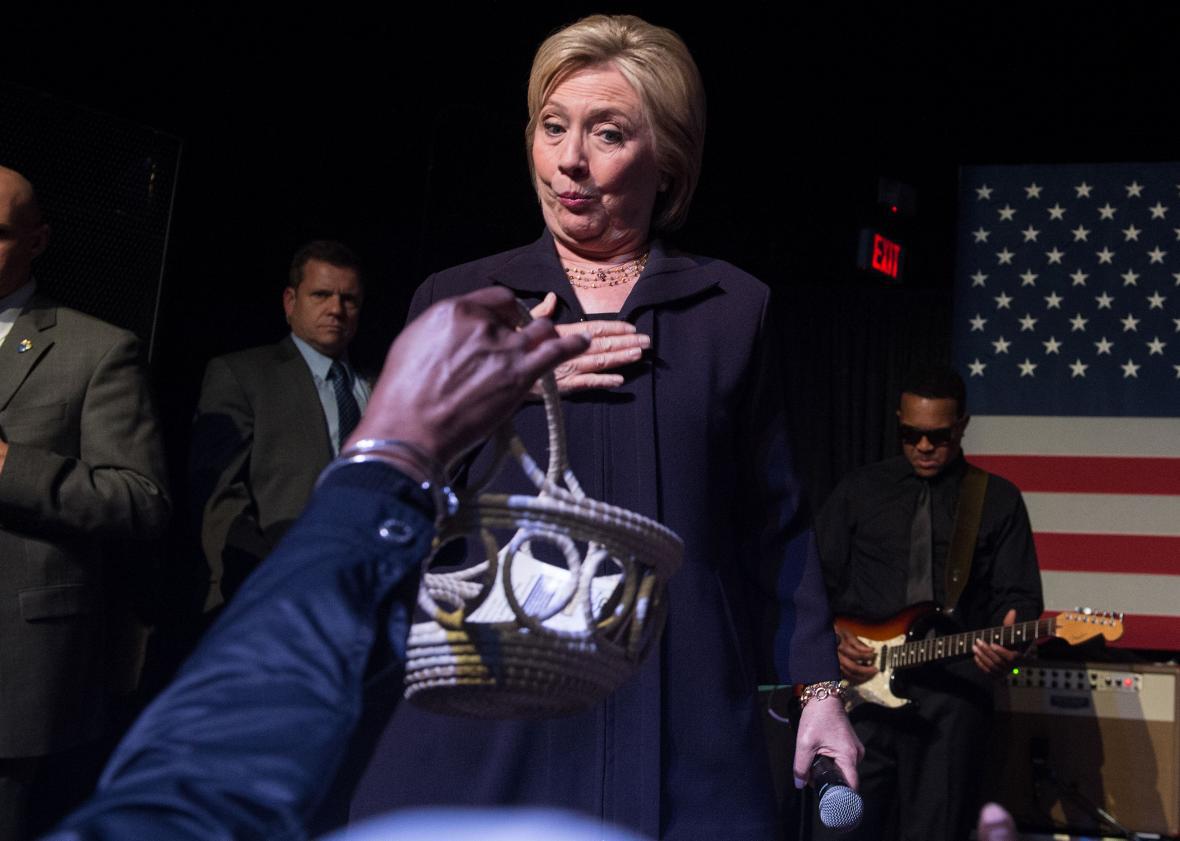Hillary Clinton caused quite the stir when she recently remarked “you could put half of Trump’s supporters in what I call the basket of deplorables.” Pundits picked apart the political impact of the gaffe, the internet had a field day with the gibe, and linguists looked at the unusual nouning of the adjective deplorable. “Basket of deplorables” no doubt stands out for its curious wording, but the expression also features a central metaphor of our time: the organizational container.
Basket, as a figure for “group,” isn’t new. In his 1916 novel The Dark Forest, English author Hugh Walpole affectionately bonded together a set of characters as a “basket” of “crazy romantics,” as the Oxford English Dictionary finds. Walpole’s turn of phrase, as does Clinton’s a century later, calls up basket case, though this pejoration for a “mentally imbalanced individual” doesn’t show up until the 1950s. The original basket cases involved rumors of soldiers who had lost all their limbs in World War I and thus, gruesomely, had to be transported in baskets.
Right after World War II, basket case was extended to countries unable to pay off debts, as if utterly maimed like those alleged soldiers. Finance took up the basket metaphor for other means around this time—and in ways that anticipate Clinton’s own basket. A basket of goods, commodities, or currencies, which take off during the midcentury, throw particular assets together for comparative evaluation. Stock traders also deal in market baskets and basket options. These financial baskets may ultimately owe some debt to the much older investment proverb, having all your eggs in one basket. And while some business people group items together in, say, a currency basket, the metaphor also works in the other direction: We sort out phenomena, such as regional markets or, in Clinton’s case, the electorate, into different baskets.
It’s another receptacle, though, that’s the go-to metaphor for such segmentation, especially in corporate jargon: the bucket. An executive may speak of divvying a budget up into sales and marketing buckets while an analyst, verbing the metaphor, will bucket brands for trend insights. Christopher Rhoads observed the buzzword back in 2007 for the Wall Street Journal: “the humble bucket has become a trendy fixture of corporate boardrooms and PowerPoint presentations,” “pushing aside other business-speak for describing categories or organizational units, such as silo and basket.” Companies may be favoring bucket over basket to obviate any confusion with actual baskets customers may be bringing up to the till.
Basket or bucket, the underlying concept of the metaphorical container is spilling over into broader political discourse, as Clinton’s use of baskets or Sasha Issenberg’s 2012 “voter buckets” suggest. And its stickiness is no accident. In fact, we can even put the reasons why into, yup, different baskets. First, receptacles like buckets and baskets are familiar and vivid. Everyone knows what a basket is and can easily conjure up an image of it. Second, the metaphor operates on a simple but effective analogy. Placing various bits into a basket or doling out fluid into buckets nicely maps onto the identification, classification, organization, and other higher-level cognitive tasks many of today’s jobs require. This points us to a third basket: utility. Modern work deals with abstract data, processes, behaviors, systems, epiphenomena; baskets and buckets help us contain, make sense of, or get control over all this complexity, making it as if we can literally manipulate and move these mental bundles around.
There may be yet deeper baskets, too. As more of our lives goes digital, new phenomena need names, and so we turn to our analog world to fill the gap with files and folders, with inboxes and desktops. Buckets and baskets work well in this space, semantic skeuomorphs whose ordinariness and domesticity lend a grounding sense of security and tangibility to our diffuse, mediated realities. The metaphor also resonates with a larger epistemological paradigm—of Freaknomics, Invisibilia, TED Talks, and the Malcolm Gladwell–ification of psychology and social science that is coming to privilege clever little “lifehacks.” Baskets and buckets also simplify, create order, and compartmentalize, picking up on our cultural obsession with productivity and decluttering. Metaphors like basket are not just woven into the very DNA of language, but, as linguists George Lakoff and Mark Johnson maintain in their seminal text Metaphors We Live By, into our very consciousness and lived reality: The “way we think, what we experience, and what we do every day is very much a matter of metaphor.”
Sure, calling a group of voters deplorables is politically problematic, in spite of the bigotry the comment was trying to highlight. But what we could be reacting to, on that more covert, subliminal level, is the metaphor itself. Though our government is polarized, our communities segregated, our everyday behaviors broken out into discrete data points for advertisers, in this era of identity politics, gender fluidity, and millennial self-invention, we no longer accept other people defining who we think we are. Only we get to decide which basket we belong in—or so we like to posture when we’re not busy categorizing everyone else. Clinton’s basket of deplorables doesn’t commit any crimes we don’t all do. It’s the reminder of this state of affairs that we find so deplorable.
